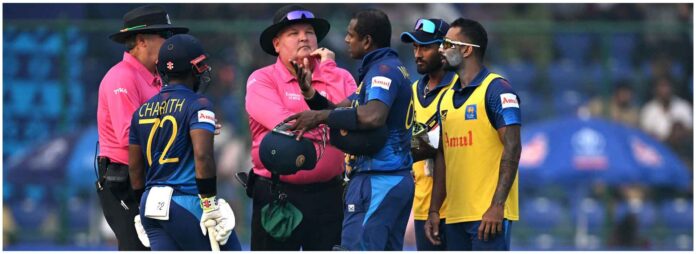The dismissal of Angelo Mathews by ‘timed out’ during the first innings of the World Cup game in Delhi between Bangladesh and Sri Lanka at the Arun Jaitley Stadium on Monday, November 6, was indeed a historic and unusual moment in international cricket.
In cricket, a ‘timed out’ dismissal occurs when a new batsman takes longer than the stipulated time to appear on the field after a wicket has fallen. This delay in taking the crease is typically expected to be within a certain period, often referred to as the “two-minute rule.” If the incoming batsman exceeds this time frame, they can be declared ‘timed out’ by the match officials, leading to their dismissal without facing a ball.
Angelo Mathews’ ‘timed out’ dismissal in a World Cup match added an extraordinary and memorable chapter to the history of international cricket, reminding players and fans alike of the importance of adhering to the rules and regulations of the game, regardless of a player’s reputation or standing in the sport. It was a unique occurrence that will be remembered for years to come as a testament to the intricacies and nuances of the sport of cricket.
The ‘timed out’ dismissal of Angelo Mathews during the match between Bangladesh and Sri Lanka in the World Cup became even more intriguing due to the sequence of events that transpired. This dismissal occurred after Shakib Al Hasan, the captain of the opposing team, successfully appealed for it during the 25th over of the first innings. What made this situation particularly notable was that the on-field umpires asked Shakib twice if he wanted to withdraw the appeal.
In cricket, once an appeal is made by the fielding side, it is typically considered a formal request to the umpire for a decision on a potential dismissal. The on-field umpires play a crucial role in ensuring that the rules and regulations of the game are followed. In this case, after Shakib’s appeal for a ‘timed out’ dismissal, the on-field umpires took the unusual step of asking him twice if he wanted to retract or withdraw the appeal.
This was a significant moment in the match, as it demonstrated the umpires’ willingness to ensure that the correct decision was made and that the spirit of the game was upheld. It also highlighted the unusual nature of the ‘timed out’ dismissal, which is not a common mode of dismissal and can sometimes lead to unique situations.
The fact that the on-field umpires sought confirmation from Shakib twice regarding the appeal added an element of drama and discussion to the match. It underscored the importance of fair play and sportsmanship in cricket, as well as the need to ensure that decisions are made in accordance with the rules and regulations of the game. Ultimately, the appeal was not withdrawn, and Angelo Mathews was dismissed ‘timed out,’ marking a historic moment in international cricket.
The International Cricket Council (ICC) Playing Conditions for the World Cup, as well as for other international cricket formats, encompass a wide range of rules and regulations that govern the conduct of the game. One such rule, which has come into effect in One Day Internationals (ODIs) since June 2023, pertains to the time limit within which an incoming batter must be ready to receive the ball after a dismissal or a batter’s retirement. This rule is in place to ensure the smooth and timely progression of the game and to maintain the balance between the competitive aspects of cricket and the need for efficient transitions between batting and fielding.
In ODIs, which includes matches played during the World Cup, the stipulated time limit for the incoming batter to be ready to receive the ball is set at two minutes. This means that once a wicket falls or a batter retires, the new batter must take their position at the crease and be prepared to face the next delivery within this two-minute time frame. The rationale behind this time limit is to prevent unnecessary delays in the game, as well as to ensure that the match maintains its momentum.
The sequence of events involving Sadeera Samarawickrama’s dismissal at 15:49 local time and Angelo Mathews entering the crease at 15:50 local time sheds light on the unique ‘timed out’ dismissal that occurred during the match. In cricket, precise timing and adherence to the rules are crucial aspects of maintaining the integrity of the game.
Sadeera Samarawickrama was dismissed at 15:49 local time, officially recorded by the scorers. Following his dismissal, Angelo Mathews, who was slated to bat next, took his position at the crease just a minute later, at 15:50 local time. However, even this short delay was enough to trigger the ‘timed out’ dismissal.
The incident involving Angelo Mathews’s helmet strap coming off while he was preparing to take strike added a layer of complexity to the ‘timed out’ dismissal. While equipment malfunctions can happen in cricket, it’s essential to recognize that the timing of events plays a critical role in these situations.
In this case, it was reported that Mathews’s helmet strap came off as he was getting ready to face the next delivery. The fourth umpire, Adrian Holdstock, revealed that by the time Mathews encountered this equipment issue, he had already exceeded the two-minute time limit specified for incoming batters to be ready to receive the ball.
The aftermath of Angelo Mathews’s ‘timed out’ dismissal in the match against Bangladesh was marked by visible frustration and disappointment. As the Bangladesh players celebrated the unique and rare mode of dismissal, Mathews was clearly upset and displayed his displeasure.
The occurrence of Angelo Mathews’ ‘timed out’ dismissal in the match against Bangladesh represents a rare and historic event in men’s cricket. This marked the seventh instance of a ‘timed out’ dismissal in men’s cricket overall. What makes this particular instance stand out is that it was the first time this mode of dismissal took place in the context of 50-over cricket, specifically in a One Day International (ODI) match.
The previous six occurrences of ‘timed out’ dismissals had all taken place in the realm of first-class cricket, which includes multi-day domestic and international matches. It had not been observed in the more limited-overs format, such as ODIs, until Mathews’ dismissal in this match.






















